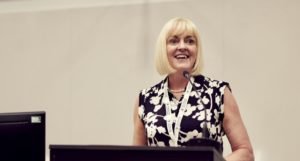University of Exeter heads to Davos to accelerate climate solutions

Copyright: World Economic Forum/Ciaran McCrickard
The University of Exeter will help drive progress on climate action at the World Economic Forum in Davos this week.
The University has organised a programme of events that builds on the findings of the recently launched and widely acclaimed Global Tipping Points Report, as it continues its work to offer solutions to the climate crisis.
Leaders in science, business and the media will come together to showcase and inspire positive change for the event Solutions to the Climate and Nature Crisis: Tipping the Balance from Negative to Positive on Wednesday 17 January.
A panel will discuss driving progress on climate action with speakers including Himanshu Gupta, CEO and co-founder of ClimateAi and Ellen Jackowski, Chief Sustainability Officer at Mastercard. The event will open with the Global Tipping Points Report, the most comprehensive analysis of negative and positive tipping points ever produced, and will close with a mulled wine drinks reception.
The event will be hosted by Arctic Basecamp, the science communications platform led by the University of Exeter Business School’s Professor Gail Whiteman, which each year pitches an Arctic research tent at the World Economic Forum.
Professor Whiteman, who has attended every World Economic Forum meeting since 2017, has led the science curation for World Economic Forum’s new ‘Climate Tipping Points Hub’, a virtual reality space accessible inside the WEF’s immersive, virtual metaverse.
Professor Whiteman is part of the Earth Decides community and will be involved in key events throughout the week, participating in the session Earth Decides: Cultivating Informed Optimism in the main WEF Congress Centre and leading the WEF Open Forum session On Thin Ice: The Consequences of Climate Breakdown (livestreamed here), which will address the irreversible collapse of Arctic summer sea ice.
Arctic Basecamp will deliver its own programme of events at Davos focusing on the Polar Region, the business and health risks associated with Polar change and climate tipping points and will be launching tools designed to mitigate climate risks during the week.
The University of Exeter Business School will host a unique event on Thursday 18 January at which Dr Jonny Keeling and Sam Boynton from BBC Studios’ Natural History Unit will give insight into the global television hit Planet Earth III, including a sneak peek at never-before-seen footage showcasing a new generation of remarkable people on the frontline of conservation who are fighting to save wildlife.
The event, held at the Hub Culture ICEHouse and entitled: Positive Tipping Points: Heroes of Nature and Climate will also feature a presentation on the Global Tipping Points Report by a lead author Dr Steven Smith. The event will open with a keynote speech by Dr Andrew Steer, President and Chief Executive of the Bezos Earth Fund who also wrote the Foreword for the Global Tipping Points Report.
The connection between climate change and global health risks will be the focus of Impacts of Global Tipping Points on Health, an Arctic Basecamp event at the SDG Tent on Wednesday 17 January.
Dr Catherine Sorbara, Deputy Director of Arctic Basecamp, will lead a high-level panel discussion with industry leaders on what impact climate change has on health – both now, and in the future – and how leadership might be mobilised for a global response.
Professor Alexandra Gerbasi will be among the expert speakers on the panel, and is set to make a special announcement about a new research project on the impact of polar climate change on global health and healthcare.
Speaking about the University of Exeter’s involvement at the World Economic Forum, Professor Gerbasi said: “We are focused on using our climate science to offer the solutions to the climate and ecological crisis that are so urgently needed. But putting positive change into action requires collaboration from a range of actors, from business leaders to government decision-makers and the scientific community, which is I’m looking forward to participating in Exeter’s programme in Davos this year.”
Professor Whiteman, a Professor of Sustainability at the University of Exeter Business School and Executive Director of Arctic Basecamp, said: “I’m excited to be returning to the World Economic Forum with the University of Exeter and Arctic Basecamp, and to be involved in some key events that aim to kick-start the conversations that will drive change, as well as launching some ground-breaking tools that will offer new ways for businesses, policy makers or anyone else to mitigate climate risks.”
“Our understanding of the risks of climate tipping points – of which the five most likely to be triggered are in the Poles – as well as positive tipping points that offer transformative change for the better, is improving all the time, and it’s vital that these ideas are communicated to our leaders so they make the right decisions to tackle climate change, biodiversity loss and other planetary pressures.”
Find out more about the University of Exeter’s programme for Davos and register for events here.



